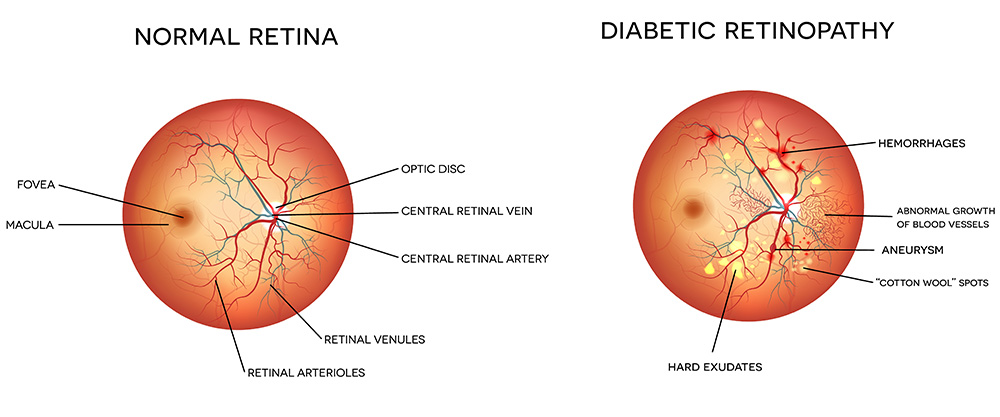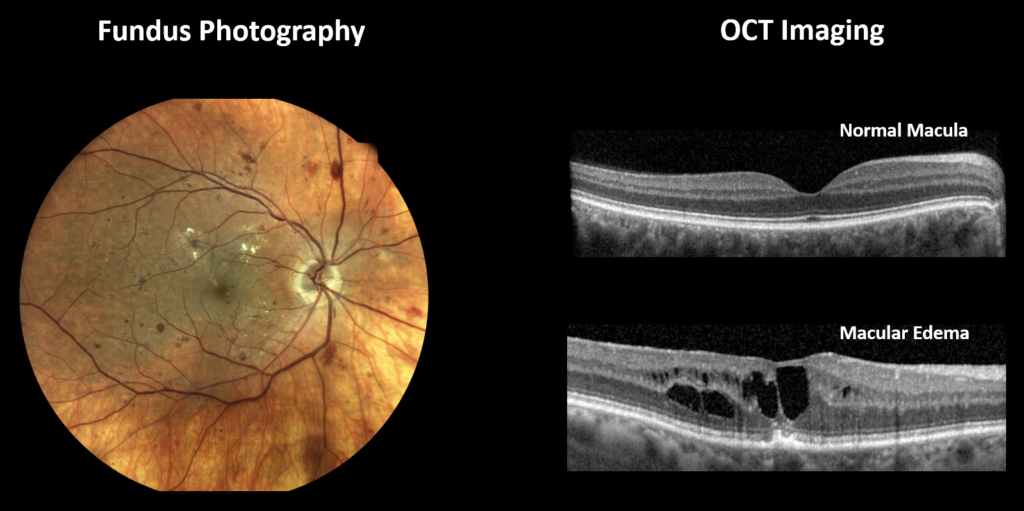X
Diabetes is a disease that affects the body’s ability to produce or use insulin effectively to control glucose (blood sugar) levels. Although glucose is an important source of energy for the body’s cells, too much glucose in the blood can cause damage in many parts of the body, including your eyes.
Your body can be affected by diabetes in many ways. It can affect your vision by causing cataracts, glaucoma, and damage to the blood vessels in your eyes. People with untreated diabetes have a risk of blindness that is 25 times higher than the average person. The longer you have diabetes, the greater the risk of developing diabetic eye changes.
The retina is a structure in the back of the eye that is analogous to the film of a camera. It detects light to produce an image we can see. Diabetic damage to the retina is called diabetic retinopathy. Early stages of this process are called nonproliferative diabetic retinopathy. In these stages, small blood vessels leak in the retina causing swelling and bleeding. Deposits in the retina called exudates also may form. When these changes occur in the central region of the retina (the macula), vision may become blurry or distorted. This condition is called macular edema.

In more advanced stages of diabetic retinopathy, abnormal blood vessels can grow on the retina. This is called proliferative diabetic retinopathy. These new blood vessels are weak, which causes them to break and bleed inside the eye. When bleeding occurs, it causes hazy vision and floaters. These abnormal blood vessels may also result in scar tissue that pulls on the retina. This traction can cause a retinal detachment.
Early stages of diabetic retinopathy may not cause noticeable vision changes. Regular eye examinations are therefore critical to detect the changes in early stages, before more severe damage occurs. Later stages of diabetic retinopathy may cause blurry, distorted, or hazy vision. Blind spots and floaters can also occur. Advanced stages of diabetic retinopathy can cause severe loss of vision.
Regular eye exams are extremely important for the detection and control of diabetic changes in the eyes. It is recommended that diabetic patients undergo dilated examinations at least annually. Several tests may be recommended by your doctor to detect and monitor diabetic changes. Color photographs of the retina help to evaluate for areas of bleeding, exudates, and abnormal blood vessel growth. Cross-sectional OCT images can reveal areas of swelling. Fluorescein angiography is a test where dye is injected into the veins of your arm and photos are taken of your eyes to evaluate for leaky blood vessels.

The treatment for diabetic retinopathy depends on the type and severity of retinal changes. Injectable medications can reduce blood vessel leakiness to help with swelling and bleeding. If this type of treatment is performed at an early stage, it can slow down vision loss. These medications are also used to reduce abnormal blood vessel growth in proliferative diabetic retinopathy.
Laser surgery, also known as laser photocoagulation, can be used to seal leaking blood vessels in the eye to reduce swelling. Laser surgery can also help with proliferative retinopathy to help prevent severe loss of vision.
In some cases, vitrectomy surgery may be performed for advanced cases of proliferative retinopathy. This procedure involves removal of the vitreous, which is the clear jelly-like substance in the center of the eye. Vitrectomy may be performed to remove large amounts of bleeding from the eye or to reduce traction on the retina that may result from abnormal blood vessel growth.
Diabetes can lead to nerve damage and reduced sensation throughout the body, including the eyes. This may result in worsening of dry eye or formation of sores on the front of the eye.
Substantial changes in blood sugar levels can affect the shape of your eye’s lens, causing blurry vision. Normal vision generally returns once blood sugar levels are stabilized.
When the lens inside the eye loses its clarity, it is called a cataract. This can result from changes to the lens due to excess blood sugar. Cataracts result in blurred vision and surgery may be needed to restore visual clarity.
Elevated eye pressure can cause damage to the optic nerve known as glaucoma. Glaucoma may constrict side vision and in more advanced cases the central vision may be involved. Uncontrolled diabetes can result in abnormal blood vessel growth over the eye’s natural drainage system, which can cause a sudden and significant elevation in eye pressure and glaucoma.
It is very important for patients to take very good care of themselves to help with the prevention of diabetic retinopathy and other diabetic eye conditions. Patients should try to maintain good blood sugar levels and good blood pressure, and avoid smoking.

Follow These 5 Easy Steps to Protect Your Eyesight:
In early stages, diabetes-related eye diseases often have no symptoms. Your eye doctor can check your eyes for signs of damage before you notice any change to your vision and begin treatment as soon as possible if signs of disease do appear.
Maintaining good control of your blood sugar helps prevent changes in the eye’s lens and damage to the blood vessels in your retina.
Keeping both under control will not only help your eyes, but your overall health!
Smoking and the use of tobacco increases your risk for diabetic retinopathy and other diabetes-related eye diseases.
An active lifestyle helps your eyes stay as healthy as possible while helping to control your diabetes.
Our excellent team of providers is here to make sure your experience is a positive one. Whether it's our doctors or our professional staff, we promise to make every effort to give you the best possible care.

Dr. Downie joined Associated Eye Care in 1995. He completed his undergraduate studies at Carleton College in Northfield, MN. He received his medical degree from The Ohio State University College of Medicine and remained there for ophthalmic residency. Dr. Downie completed fellowship training in vitreo-retinal surgery at the Charles Retina Institute in Memphis, TN. Dr. Downie’s practice emphasizes medical and surgical management of diseases of the retina and vitreous humor, including retinal detachments, macular degeneration and diabetes.
In his spare time, Dr. Downie enjoys bicycling in any and all conditions, hiking, and scuba diving. He and his wife have three children.